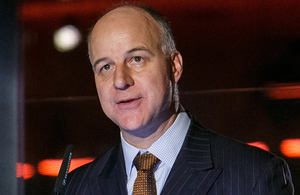Tim Richards announced as new chair of the British Film Institute
Tim Richards has been appointed as the next Chair of the BFI, Culture Secretary Oliver Dowden has announced today.
Oliver Dowden has confirmed that Richards will take up the position as Chair from Tuesday 16th February and will serve a term of up to 3 years.
Since Richards founded Vue International in 1999, the cinema operator has expanded to 225 multiplex cinemas across Europe and Taiwan attracting over 100 million customers a year to screenings. He joined the BFI as a Governor in 2013 and has held positions on many industry boards since 2007.
Oliver Dowden, Culture Secretary, said:
The BFI showcases the great creativity and innovation of the UK’s hugely successful screen sectors, which are already bouncing back strongly. I know Tim will be a brilliant champion for the industry and his extensive experience will help ensure the BFI plays an important role in our cultural and economic recovery.
Tim Richards, BFI Chair Designate, said:
I am honoured and thrilled to have been asked to chair the BFI, especially at such a crucial time for the arts and cultural sector. British film and television have always had a unique power to inspire people globally and I am confident that Britain’s talent and creativity will help lead the screen industries to a great future.
Ben Roberts, BFI Chief Executive, said:
It’s great news that Tim Richards will be the BFI’s new Chair. Having been on the BFI Board for 7 years, Tim is already under the skin of our organisation, and has been an incredible supporter and champion of the work we do across film culture. His experience and knowledge of the business of film, particularly across exhibition but also across skills and education, will be enormously valuable to the BFI and I am very much looking forward to working closely with him as he steers us into our next exciting chapter.
The appointment process for the BFI chair is made in accordance with the Cabinet Office’s Code for Public Appointments and is regulated by the Office of the Commissioner for Public Appointments’ (OCPAs).
Official figures recently released by the BFI revealed strong signs of economic recovery in UK film and high-end TV production, including a £1.19 billion upturn in production spend for film and high-end TV in the last three months of 2020. Restarting film and TV activity has been made possible by the Government’s £500 million Film and TV Production Restart Scheme, which has already supported more than 170 productions across the UK.
The BFI has also awarded more than £16 million in grant support to over 200 independent cinemas from the Culture Recovery Fund on behalf of the Department for Digital, Culture, Media and Sport. More grant applications from independent cinemas are also currently being assessed. At the start of the year, cinemas were able to apply for another £14 million in grants as part of the second round of the Culture Recovery Fund. The new round of funding is in addition to the £30 million already being allocated by the BFI.
ENDS
Notes to Editors
In 1999, Tim Richards left Warner Bros. Studio in Los Angeles to found Vue International, which has grown into a leading international cinema operator with 225 multiplex cinemas in nine countries in Europe and in Taiwan. Over the course of the past 30 years in cinema exhibition, Tim has developed extensive international experience in all major markets globally. In December 2020, Variety Magazine named Tim as one of the 500 most influential business leaders shaping the global $2 trillion entertainment industry. The Hollywood Reporter named Tim as one of the top five entertainment innovators of the Year and The Independent newspaper named Tim as one of the “20 Most Influential People in Film”.
All appointments are made on merit and political activity plays no part in the selection process. There is a requirement for appointees to publicly declare any political activity. No political activity has been declared by Tim Richards.
About the BFI
The BFI is the UK’s lead organisation for film, television and the moving image. It is a cultural charity that:
- Curates and presents the greatest international public programme of world cinema for audiences; in cinemas, at festivals and online
- Cares for the BFI National Archive – the most significant film and television archive in the world
- Actively seeks out and supports the next generation of filmmakers
- Works with Government and industry to make the UK the most creatively exciting and prosperous place to make film internationally
Founded in 1933, the BFI is a registered charity governed by Royal Charter.
